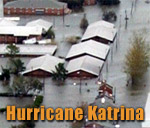UC Berkeley Web Feature
Faculty members mobilize to aid relief effort; students and alumni offer assistance on campus
BERKELEY – In the wake of Hurricane Katrina, UC Berkeley is putting to work its scholars' expertise and commitment to public service. Many faculty members whose research is directly related to Katrina are moving quickly to help the victims and emergency relief agencies and to provide insight and perspective on the disaster.
Last Thursday, UC Berkeley's Center for Information Technology Research in the Interest of Society (CITRIS) held a town hall meeting at UC Berkeley to mobilize campus researchers in the New Orleans rebuilding effort. Civil engineering professor Bob Bea, former chief of offshore civil engineering for Shell Oil, summarized the situation along the Gulf Coast and proposed that campus experts "put feet on the ground" in New Orleans to assess the situation and learn lessons for the future.
"We need to go to ground zero to gather data and preserve the things that can get trashed or lost (in the recovery effort)," Bea said. "CITRIS can help to preserve and analyze this data."
While Bea will focus on offshore issues, other researchers are analyzing other aspects of the tragedy. They include:
- Ray Seed, a geotechnical engineer who is spearheading an effort to assess the levee and flood walls. Seed wants to apply what he learns to California's levees in the San Joaquin delta, which are vulnerable to earthquakes. If they go, he says, most of Southern California will lose its water supply for months or even years.
- Karlene Roberts, a professor of organizational behavior in the Haas School of Business and an authority on the management of organizations and systems in which error can be catastrophic. She is heading an effort to identify organizational breakdowns in the Katrina catastrophe. They may involve groups including the family, neighborhood, emergency services, and state, local and federal government, she says.
- Civil engineering professor Jack Moehle, director of the Pacific Earthquake Engineering Research center, who is emphasizing the need to steer the new federal interest in disaster preparedness to California's earthquake-prone areas, not just to the hurricane areas of the Southeast. He and architecture professor Mary Comerio, an internationally recognized authority on post-disaster reconstruction issues, are working on a project to look at disaster preparedness and recovery in the area and its implications for New Orleans as well as the San Francisco Bay Area.
Among the other UC Berkeley departments lending aid and expertise is the School of Social Welfare, which has mental health experts and other staff and faculty who regularly do field work and are called on by the Red Cross to assist in disasters.
Getting settled
In order to acclimate to campus life and deal with the stress of being displaced by Katrina, the visiting students are being offered a number of resources on campus.
The Cal Student Orientation (CalSO) office provided a special orientation session for the displaced undergraduate students and is currently matching counselors with individual students through a buddy system in which pairs will work together throughout the semester on any issues that arise.
The California Alumni Association is setting up a program so that alumni can serve as virtual mentors, and University Health Services will be starting a mentoring program within a few weeks to provide support throughout the semester.
University Health Services has also set up a Web site related to Katrina that includes material on coping with traumatic stress, how to help colleagues affected by the disaster and about an ongoing weekly support group for those impacted by Katrina.
Fund-raising
In addition to the Katrina Emergency Fund, which collected $12,000 over the weekend after being launched last Friday, a committee at Boalt Hall that includes students, faculty and staff is working on the creation of a fund to meet any needs in the coming months of the visiting law school students.
The campus is asking individuals who want to donate items such as clothes and bikes to contact a charity helping the hurricane victims. UC Berkeley is continuing to work with corporations and foundations interested in donating either money or specific in-kind donations to benefit these students.
Businesses and foundations that have already contributed money or goods include Longs Drugs, Levi Strauss & Co., the Thomas J. Long Foundation, the Bernard Osher Foundation, and other Bay Area companies and philanthropic organizations.
The campus community began dipping into its pockets early on, collecting $25,000 for the Red Cross at the Sept. 3 home opener football game. Students have been dropping dollar-by-crumpled-dollar donations into big blue rubber tubs on Sproul Plaza at lunchtime. This week, several UC Berkeley student organizations that have banded together as Cal Katrina Relief plan a series of fund-raising efforts to benefit the Red Cross.


